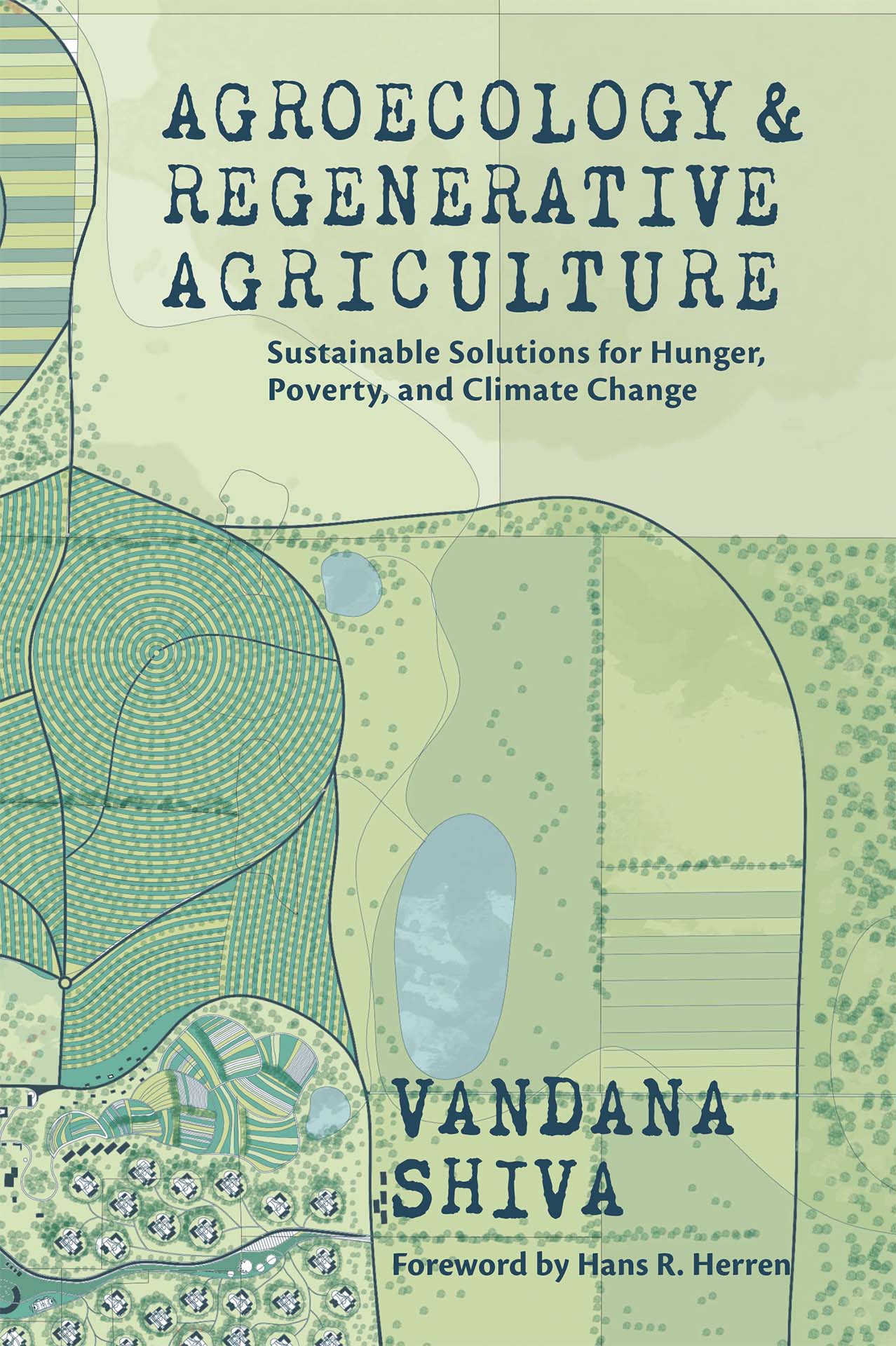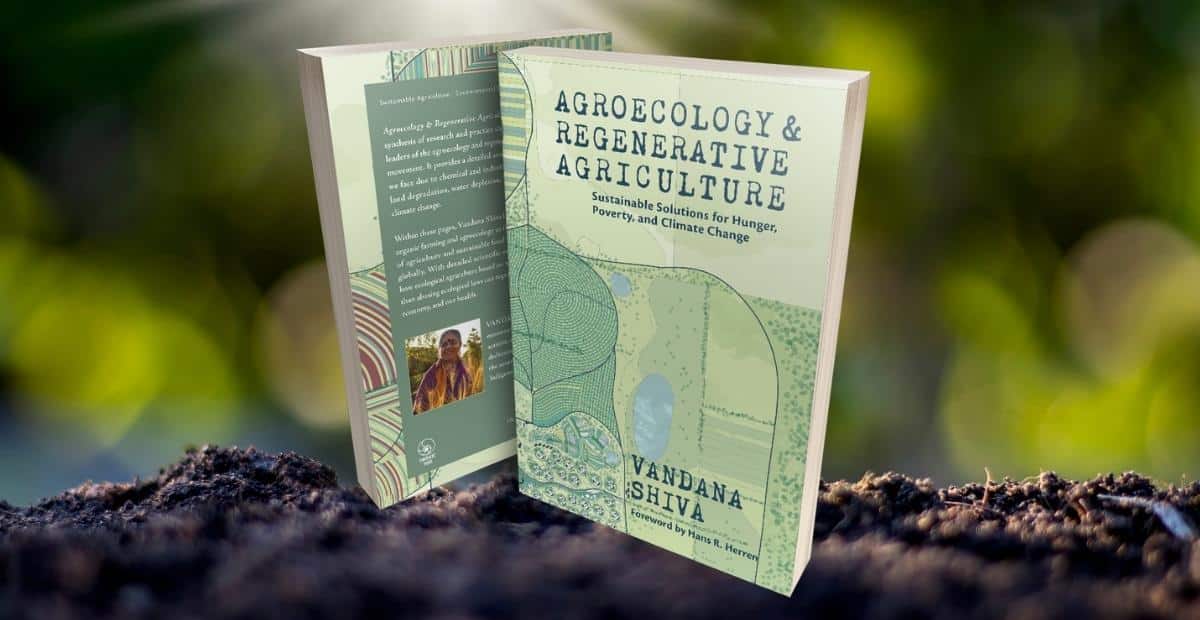The following is an excerpt from Agroecology & Regenerative Agriculture: Sustainable Solutions for Hunger, Poverty, and Climate Change by Dr. Vandana Shiva:
Biodiversity is the Foundation of Agroecology
Agroecology is the scientific paradigm for sustainable agriculture. Agriculture is and should indispensably be a life-enhancing phenomenon. Production of a variety of healthy and nutritious foods requires a productive and healthy agroecosystem reverberating with biodiversity in its forest, cropland, and livestock. Agriculture based on healthy, biodiversity-laden, and vibrant agroecosystem is naturally the agriculture rooted into its inexhaustible source of nature: the solar-powered agroecosystem.
Agroecology is the holistic study of agroecosystems, including all environmental and human elements. It focuses on the form, dynamics, and functions of their interrelationships and the processes in which they are involved (Altieri 1987; Reijntjes et al. 1992). Intercropping, agroforestry, and other traditional methods mimic natural ecological processes. The sustainability of many local practices lies in the ecological models that agroecologists follow. By designing farming systems that mimic nature, farmers can get the optimal use out of sunlight, soil nutrients, and rainfall (Reijntjes 1992).
Agroecology gives deeper meaning to agriculture. It integrates agriculture with ecology. It helps us understand the direct relationship between agriculture and ecology. It teaches us to be in tune with nature while producing a diversity of healthy, nutritious, and delicious foods using sources of nature. In essence, agroecology is the philosophy of relishing all edibles that nature produces and, at the same time, nurturing nature so that it can blossom with biodiversity.
Agroecology is now a separate discipline of agriculture and ecology. It is the central concept of many valuable ideas, philosophies, approaches, strategies, and tactics of life which include natural farming, traditional agriculture, permaculture, biodynamic farming, integrated pest management, organic agriculture, and sustainable agriculture. Agroecology uses ecological theory to study, design, manage, and evaluate food production systems. It is the concept on which sustainable agriculture—which ensures the future of agriculture—has been built. It is through applying the principles of agroecology that we protect, conserve, and augment natural resources such as forests, grasslands, livestock, soil, water resources, and farming. Agroecology appreciates and strengthens interactions among all crucial biophysical, socioeconomic and technical components of the agroecosystems. All components are regarded to be fundamental units of an integrated system.
Agroecology helps us understand and maintain vital mineral cycles, biological processes, energy transformations, and socioeconomic relationships in an integrated manner. Agricultural strategies woven around the principles of agroecology look into local geographical, socioeconomic, environmental, and cultural specificities and obey traditions, such as food habits, festivities, and ethical or aesthetic values.
In essence, agroecology is the philosophy of relishing all edibles that nature produces and, at the same time, nurturing nature so that it can blossom with biodiversity.
A one-dimensional monoculture view of conventional agriculture has no place in agroecology. An understanding of ecological and social levels of co-evolution, structure, and function is instead necessary (Altieri 2000). Rather than focusing on one particular component of the agroecosystem, agroecology emphasizes the interrelatedness of all components and the complex dynamics of ecological processes (Vandermeer 1995). Agroecology is a holistic response to agribusiness-based exploitative technologies and trade for profits, which have no room for other values of life and are not conscious of the future of the planet. Agroecology, on the other hand, does not overlook technical and economic aspects but is very much alive to social, cultural, and environmental issues, firmly standing for the present and future well-being of society.
Food production needs are central to the concept of agroecology. The performance criteria in agroecology takes into consideration vital contemporary issues, namely, ecological sustainability, food security, and climate change mitigation and adaptation. Traditional concepts of organic farming, natural farming, and ecological farming offer to resolve numerous issues from the individual family to the global level, from seed to swaraj (self-rule), from agribusiness empire to genuine socialism, from food security to food sovereignty, from ecological disaster to ecological affluence, and from climate chaos to climate order.
Dr. Vandana Shiva is an author, physicist, ecologist, and advocate of biodiversity conservation and farmer’s rights. Her pioneering work around food sovereignty, traditional agriculture, and women’s rights created fundamental cultural shifts in how the world views these issues.
Along with Jerry Mander, Edward Goldsmith, Ralph Nader, and Jeremy Rifkin, Dr. Shiva is a leader and board member of the International Forum on Globalization and a prominent figure of the global solidarity movement known as the alter-globalization movement.
Dr. Shiva founded Navdanya, an organization that promotes agroecology, seed freedom, and a vision of Earth Democracy, seeking justice for the Earth and all living beings. She has authored more than 20 books including Reclaiming the Commons: Biodiversity, Indigenous Knowledge, and the Rights of Mother Earth (Synergetic Press, 2020), Philanthrocapitalism & The Erosion of Democracy: A Global Citizens’ Report on the Corporate Control of Technology, Health, and Agriculture (Synergetic Press, 2022) and Agroecology and Regenerative Agriculture: Sustainable Solutions for Hunger, Poverty, and Climate Change (Synergetic Press, 2022).
Dr. Shiva is a member of the scientific committee of the Fundacion IDEAS, Spain’s Socialist Party’s think tank and the International Organization for a Participatory Society. She received the Right Livelihood Award in 1993, an honor known as an “Alternative Nobel Prize”. She has received numerous other awards and honors for her work including the “Save the World” award in 2009 and the Sydney Peace Prize in 2010. Dr. Shiva’s life and work is the subject of the award-winning 2021 documentary, “Seeds of Vandana Shiva.”

Featuring the work of Navdanya, an organization founded by Dr. Vandana Shiva that promotes agroecology, seed freedom, and a vision of Earth Democracy that seeks justice for the Earth and all living beings, this work serves as a guidebook for agriculture scientists, policy makers, environmentalists and every individual who cares about their own health as well as the vitality of the planet.
Agroecology and Regenerative Agriculture, provides a detailed analysis of the multiple planetary dilemmas we face due to chemical and industrial agriculture, including land degradation, water depletion, biodiversity erosion, climate change, agrarian crises, and health crises while also focusing on practical and evidence-based solutions.
Those solutions include methods of using biodiversity-based organic farming to regenerate soil, conserve water, increase climate change resilience, and ensure food security in rural populations. As editor, Dr. Shiva takes an organized approach to these wide-ranging topics and provides practical knowledge that can inform the future of agriculture and sustainable food systems. With detailed scientific evidence, Agroecology and Regenerative Agriculture shows how an ecological agriculture based on working with nature can regenerate the planet, the rural economy and our health.

